Directions (1 – 5): The following data shows the working hours for three employees in week days to complete a task. The working hours also indicates the time taken by them to complete the same task alone. Read the following questions and answer carefully.
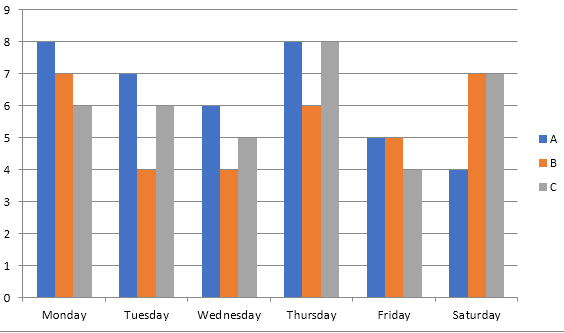
Q1. What is the difference between average of working hours of A on Monday and Saturday together and average of working hours B on Friday and Saturday together?
(a) 0
(b) 1
(c) 0.5
(d) 2
(e) 2.5
Q2. On Tuesday, If A takes half the working hour time to complete a work while B takes equal time as A and C takes 50% more time to complete the same work alone. What will be the ratio of their working efficiency to complete a work?
(a) 7 : 7 : 18
(b) 7 : 18 : 18
(c) 18 : 18 : 7
(d) 18 : 7 : 18
(e) 9 : 9 : 4

 Q5. What is the ratio of total work hour of A and C together throughout the week to that of B throughout the week ?
Q5. What is the ratio of total work hour of A and C together throughout the week to that of B throughout the week ?
(a) 7 : 5
(b) 5 : 2
(c) 31 : 13
(d) 37 : 15
(e) 74 : 33
Directions (6-10): First line graph shows the Cost Price as a percentage of mark price of a product and second line graph shows the mark price as a percentage with respect to the selling price of a product in five different years from 2001 to 2005.
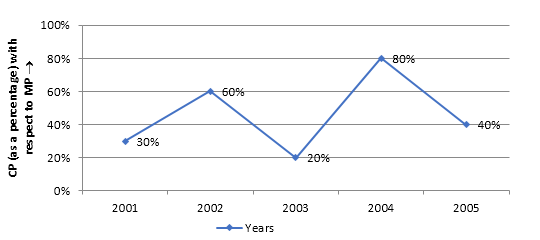
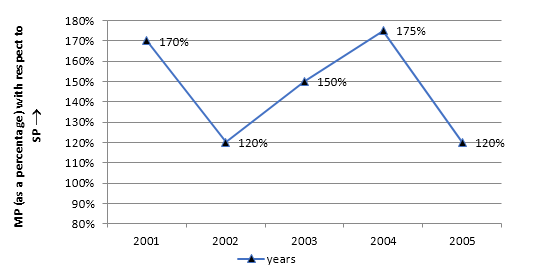
Q6. If the mark price of the product in the year 2002, 2003 and 2005 was same then the CP of the product in year 2002 and 2003 together was what percent more than the cost price of the product in the year 2005?
(a) 100%
(b) 125%
(c) 150%
(d) 200%
(e) 50%
Q7. If the CP of the product in year 2006 was 3/8 th times of the CP of the product in year 2005 and there was same profit (in Rs.) in year 2006 as in year 2005, then find the selling price (in Rs) of the product in year 2006 if selling price of the product in year 2005 is 100 Rs.
(a) 50 Rs
(b) 60 Rs.
(c) 70 Rs
(d) 40 Rs.
(e) 80 Rs
Q8. If the cost price of the product in year 2001, 2002 and 2003 were same then find the ratio of mark price of the product in the same year?
(a) 1:3:2
(b) 3:2:1
(c) 1:2:3
(d) 2:1:3
(e) 1:4:2
Q9. If the mark price of the product in year 2003 was 1050 Rs and cost price of the product in year 2004 was 700 Rs then find the average selling price of the product in year 2003 and 2004 together?
(a) Rs. 560
(b) Rs. 350
(c) Rs. 450
(d) Rs. 800
(e) Rs. 600
Q10. Total CP of the products in all of the given years together was what % less then the total MP of the product in all of the given years?
(a) 64%
(b) 52%
(c) 62%
(d) 65%
(e) Can’t be determined
Directions (11-15): The graph given below shows the number of bats & balls available in a store of different brands. Bar graph shows the number of ball and pie chart shows the number of bats
Note- There are balls of five brands and bats of six brands
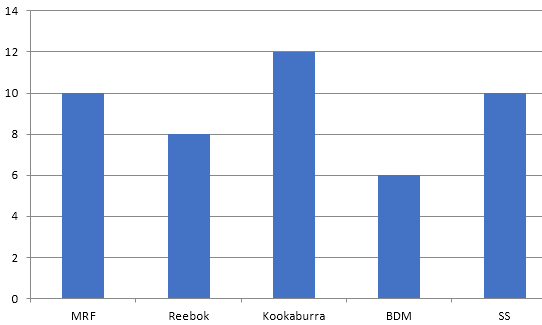
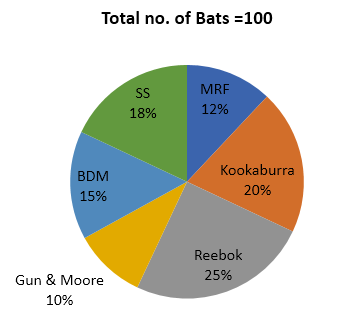
NOTE– There are balls of five brands and bats of 6 brands
Q11. Rahul wants to buy a pair of bat and ball of same company. What is the probability that he buys a pair of his choice, if he has to pick up a pair from a bag which contains a bat and a ball of each company.
(a) 1/6
(b) 2/3
(c) 5/6
(d) 1/7
(e) 1/5
Q12. Rvinder has to choose balls of three companies i.e. MRF, BDM and SS. If he has to choose 6 balls, then in how many ways can he choose 6 balls so that there are 4 balls of BDM company.
(a) 2430
(b) 1500
(c) 2530
(d) 2650
(e) 2470
Q13. The storekeeper puts all the bats in a bag. What is the probability of picking up two bats of Gun & Moore without replacement if a person wants to pick up 3 bats?
(a) 33/1078
(b) 43/1078
(c) 27/1078
(d) 55/1078
(e) 47/1008
Q14. Among the balls of Reebok and SS there were 4 and 6 balls defective respectively. The storekeeper offers a boy 3 chances to pick up a ball of these two companies. What is the probability of boy picking up a defective ball ?
(a) 5/32
(b) 5/34
(c) 5/36
(d) 5/38
(e) none of these

Solutions
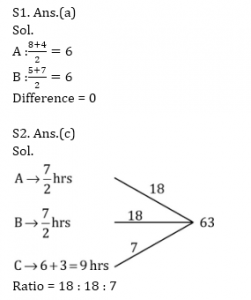
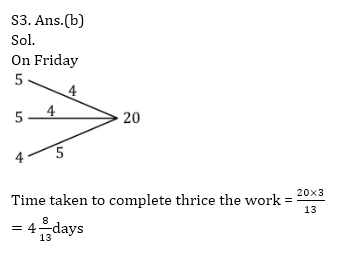
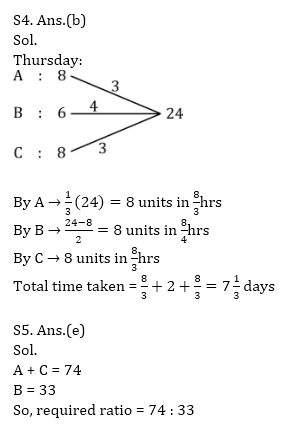
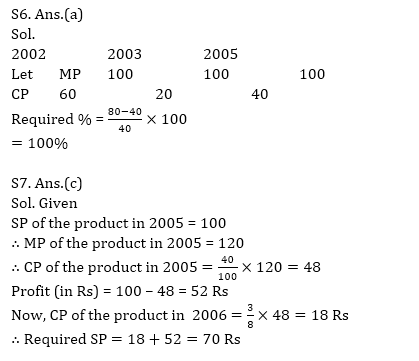
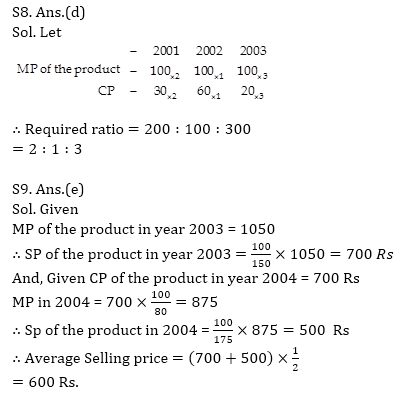
S10. Ans.(e)
Sol. Since we don’t know exact values of M.P. and C.P. Hence the answer can’t be determined.
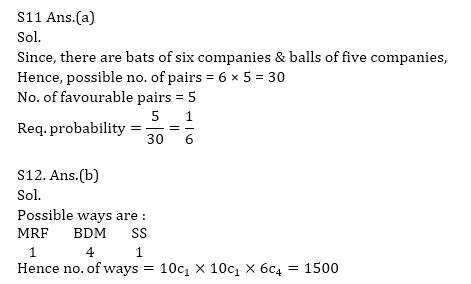
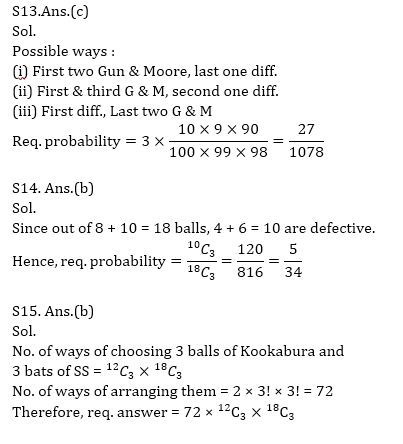

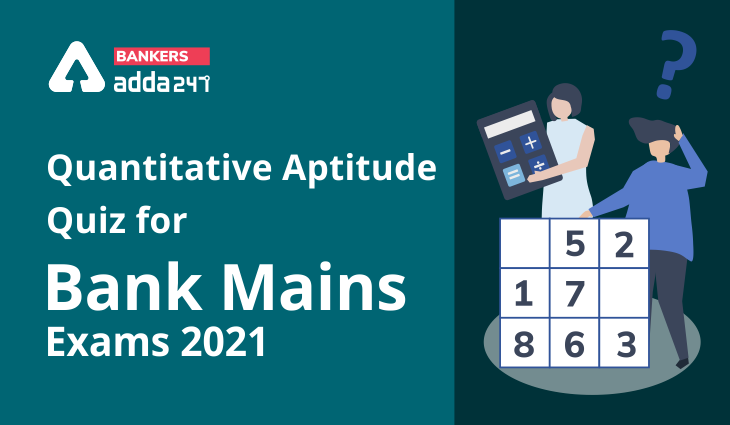

 GA Capsule for SBI Clerk Mains 2025, Dow...
GA Capsule for SBI Clerk Mains 2025, Dow...
 The Hindu Review October 2022: Download ...
The Hindu Review October 2022: Download ...
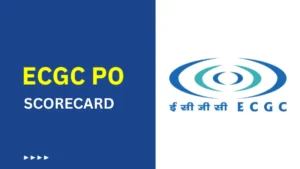 ECGC PO Scorecard 2025 Out, Check Marks
ECGC PO Scorecard 2025 Out, Check Marks




